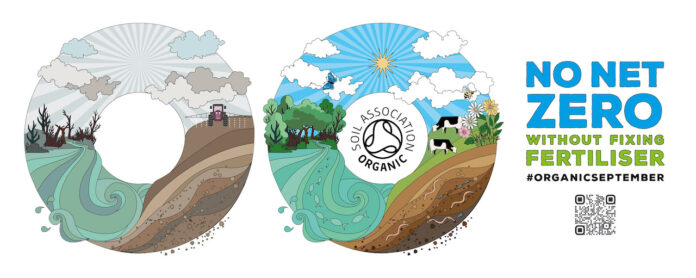There’s no net zero without fixing fertilizer: this is the message of a new petition launched by the Soil Association (SA) which urges Government to take immediate action on fossil fuel-based nitrogen, which the charity warns is ‘300 times more potent at warming the atmosphere than CO2’.
“We want all UK governments to take action on nitrogen, but we are targeting the Westminster Government first, as the biggest player, because they have ultimate UK accountability for net zero and the vast majority of fertilizer use is in England,” says Gareth Morgan, head of farming policy at the SA.
With a new poll, timed to coincide with Organic September, showing that 62% of the UK wants the Government to prioritize policies which tackle climate change, the SA hopes public pressure will spur the Government into urgently setting fertilizer reduction targets for farming – without which, it warns, the UK’s net zero commitments would be unrealistic.
The Government’s current Net Zero Strategy ‘offers no plan for tackling the problem’ of greenhouse gas emissions from the manufacture and use of fertilizer. Morgan calls this omission ‘shocking’. “The Government’s Net Zero Strategy makes only a passing mention of the impact of fossil fuel-based fertilizers on the climate and environment. Even more alarming … they have no plan in place to support farmers to reduce their reliance on them. The production of nitrogen fertilizer is highly dependent on expensive and polluting fossil fuels, making farmers very vulnerable to huge price spikes and global events like the Russian invasion of Ukraine.
UK farming can’t simply go cold turkey on nitrogen
“Agriculture and the food system are responsible for a third of all greenhouse gas emissions and failing to address this will mean that the Government has simply no prospect of meeting its net zero target.”
Nitrogen, explains the SA, is a key contributor to climate change. “In its active form, such as in fertilizer, it releases nitrous oxide when exposed to soil causing microbial reactions. This gas is 300 times more potent at warming the atmosphere than carbon dioxide – and it remains active for more than 100 years – almost ten times longer than methane. These agricultural emissions contribute 25% of the particulate pollution in London’s air, 32% in Birmingham and 38% in Leicester in 2019.”
It is therefore vital, says Morgan, that the Government not only sets a target for reducing fossil fuel-based fertilizer consumption but offers incentives and advice to farmers to support them in transitioning away from dependence on nitrogen fertilizer and adopting more nature friendly approaches.
“UK farming can’t simply go cold turkey on nitrogen. However, the Government and farmers can utilize the decades of experience and research in the organic farming sector – which is not permitted to use these harmful fossil fuel-based products. Organic farmers build natural fertility using nature friendly farming practices incorporating natural fertilizer, crops including legumes and clover in rotations, and a whole farm system approach. This experience can help conventional farmers to reduce their reliance on costly inputs which will deliver significant benefits for the climate and biodiversity.”
We are targeting the Westminster Government first, as the biggest player, because they have ultimate UK accountability for net zero
After the poll showed that only a third of the public are aware of the extent to which fossil fuel-based fertilizers negatively impact the environment, Morgan encourages Brits to engage with the petition. “Our over-reliance on artificial fertilizers is contributing to air pollution, dying rivers, depleted soils and the rapidly warming climate. Emissions from fossil fuel-based nitrogen fertilizers are contributing to the climate emergency.
“This fossil fuel-reliant system has been a quick fix for producing more food but has come at a huge cost to nature, climate and human health.
“There is a way to farm that works with nature, for the benefit of people, wildlife, and the planet. Organic standards ban the use of synthetic nitrogen fertilizers. Modelling by French think tank IDDRI suggests that if the whole of Europe switched to an organic or agroecological food and farming system combined with key dietary changes, we could see a 40% drop in greenhouse gas emissions. Half of this drop would result from a cut in the use of fossil fuel-derived nitrogen fertilizer.”
Add your name to the There’s no net zero without fixing fertiliser petition here.











